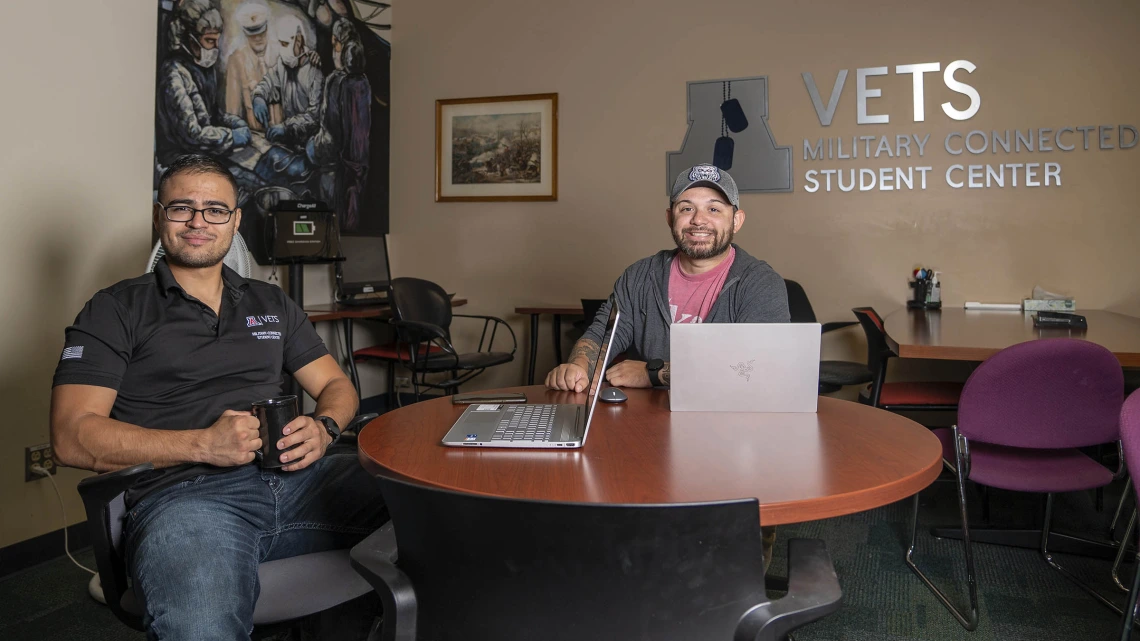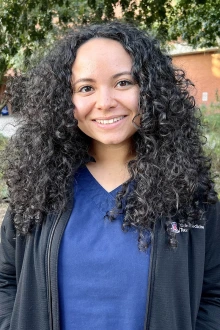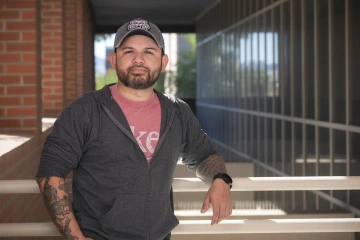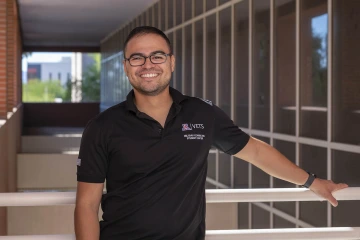VETS Center at UArizona Health Sciences Is Veterans Sanctuary
One of two locations on campus, the VETS Center at the UArizona Health Sciences Library provides a safe and friendly space for students and faculty.

Advocacy Liaisons Sergio Lopez and Giovanni Alvarado, who staff the VETS Center at the UArizona Health Sciences library, are also veterans ready to help others like them.
For Marlene Gonzalez, a University of Arizona College of Medicine – Tucson second-year medical student, the Veterans Education and Transition Services (VETS) Center at the UArizona Health Sciences Library is a home away from home.

Marlene Gonzalez, a second-year medical students in the College of Medicine – Tucson and former U.S. Navy petty officer second class, finds refuge and friendship at the VETS Center.
“Honestly, I feel like if I hadn’t been at the VETS Center getting tutoring, learning how things get done, meeting people there, I don’t feel like I would have made it this far,” Gonzalez said. “I met a lot of cool people who connected me to some internships and told me what kind of extracurriculars to get involved in. They provided that mentorship so that I could get from there to here.”
The VETS Center, a university-wide program, has two locations, one of which is located on the second floor of the Health Sciences Library, part of Universities Libraries. It is a place for Gonzalez and all veterans, their spouses and dependents, to get academic help, meet friends, eat lunch, study, check emails or just chill.
For Gonzalez and others like her, the friendly and welcoming atmosphere at the VETS Center is a lifeline. There’s always fresh coffee and food, and anyone can use the VETS Center’s computers and printers. The center hosts bowling events at Lucky Strike Bowl and tailgate parties at Wildcat home football games. For military-connected students, there’s counseling, career assistance and resource fairs.
The comradery and support stems from fellow veterans, including Sergio Lopez and Giovanni Alvarado, who staff the UArizona Health Sciences Library VETS Center as customer service representatives, or Peer Advocacy Liaisons.
Lopez, 36, is in the center Tuesdays and Thursdays. Alvarado, 25, is there Mondays, Wednesdays and Fridays. Both can also be found at the VETS Center in the Student Union Memorial Center, where Alvarado also does first-year orientations for new military-connected students. Both tease Gonzalez in a friendly way, like she’s their sister.

Sergio Lopez is a former Navy radar and navigation systems specialist turned data science student who is a peer advocacy liaison at the VETS Center.
Gonzalez smiles and adds with a laugh, “This is where I go to when I want to hide from the scary med students,” referring to some of her more intense peers.
“The ones who can’t take a joke?” jests Alvarado, a former U.S. Marine now in the National Guard in Tucson.
Veterans who don’t use the center every day are encouraged by Lopez and Alvarado to visit more. Soon, they’re not “them,” but a part of the group. That group offers a unique support system for military-connected students, because they’ve “been there, done that.” Since they’ve all been in the military, they can relate, Lopez said.
“If I hadn’t been at the VETS Center getting tutoring, learning how things get done, meeting people there, I don’t feel like I would have made it this far.”
Marlene Gonzalez, second-year medical student, UArizona College of Medicine – Tucson
He underscored the experience of being in the military, where no matter the branch of service, all made it through basic training and lived in close quarters together in a barracks or onboard a vessel, and how that helped prepare veterans to function as part of a group – a team working toward a mutual goal.
“The non-veteran students are all independent, working toward graduation on their own. That’s great. Often, though, they have nothing that’s relatable, and so they don’t relate unless they have a class together. Whereas, I was not in the Marine Corps, and he wasn’t in the Navy,” Lopez said, pointing at Alvarado, “but we can still just banter about it because we relate because we were both in the military.”
Lopez and Alvarado said they understand the pressure to succeed, and they recognize the stress that goes with that. Through the VETS Center, they are able to help military-connected students through it, said Alvarado, who is majoring in public policy in the UArizona College of Social and Behavioral Sciences.
Alvarado and Lopez underscore the VETS Center is both a social and resource center not just for veterans, but also for their friends and classmates, too. They don’t have to be UArizona Health Sciences students, either. Lopez, a data science student in the UArizona College of Social and Behavioral Sciences, said he frequently meets with his study groups there. Alvarado mentions a few non-military friends of veterans they have “adopted as military brats.”

Giovanni Alvarado, a former U.S. Marine who is on active duty with the National Guard, is a peer advocacy liaison in theVETS Center.
“People can come out and have a safe place to meet and talk and study and use library resources that can help them,” Alvarado said, adding that the progression from military veteran to college graduate can be challenging.
Gonzalez remembers her first year on campus as a medical student as a rough time.
“A lot of people say that it’s like drinking from a firehose. It didn’t feel like that. It felt like I just got dropped in the middle of the ocean and I had to figure out where shore was,” she said. “It was so different from how undergrad was.”

